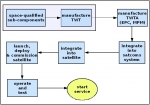Displaying items by tag: Qband
A Market Forecast For High-Frequency, Space-Qualified, TWTs
I published an article on the market need for High-Frequency, Space-Qualified, TWTs, those operating in Q/V-band.
You can download it from here:
http://www.black-kite.co.uk/downloads.php
http://www.black-kite.co.uk/downloads/SM_Mar2012.pdf
Synopsis
This article provides an overview of the history of Ka-band satellite development, focusing on the satellite requirements for Ka-band TWTs. Presented is a forecast of the number of Ka-band TWTs that may be required over the next decade. Satellite companies need to consider higher frequency TWTs, at Q- and V-bands, to maintain pace with communications requirements. Market drivers for this are being seen from governments, business and consumers. Satellite operators, space agencies and others are showing increased interest in higher frequency TWTs. From this data, an outline assessment of the potential size of a Q/V-band TWT market is offered.
Satellite communications use various frequency bands, ranging from L-band (approximately 1 GHz to 2 GHz) to Ka-band (approximately 26 to 40 GHz). Travelling wave tubes (TWTs) are specialized and essential components for SATCOMs and are required in both the space and ground segments to create an end-to-end communications chain. The TWT market is dominated by two world players, L-3 Communications in the U.S. and Thales Electron Devices in Europe, who together hold nearly 90 percent of market share, mainly in the lucrative Ku-and Ka-bands. Growing pressures for faster and higher quality communication services are driving the need to find more bandwidth to serve the increasingly hungry data and broadcast applications (e.g., interactive gaming, HDTV). To satisfy this insatiable demand, higher frequencies are being considered, which necessitates the development of TWTs operating at higher frequencies, namely Q & V bands.

